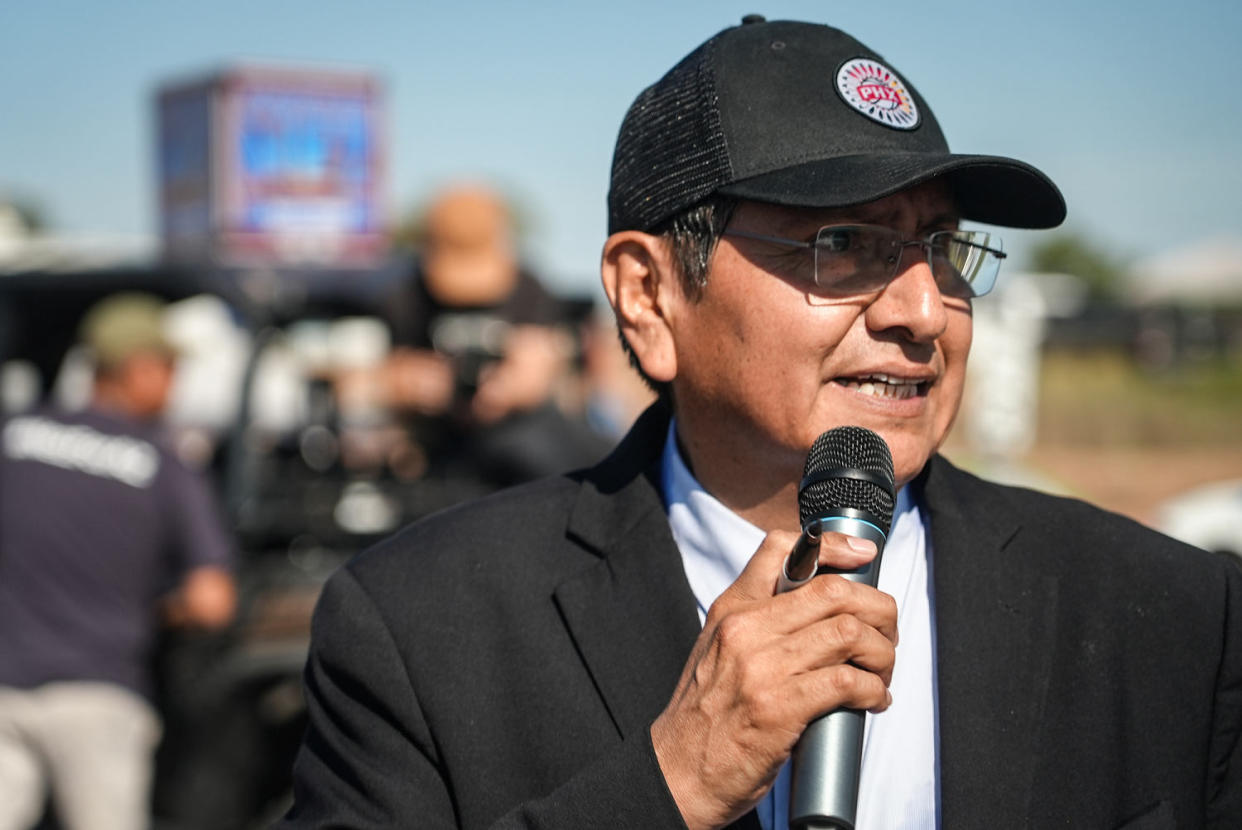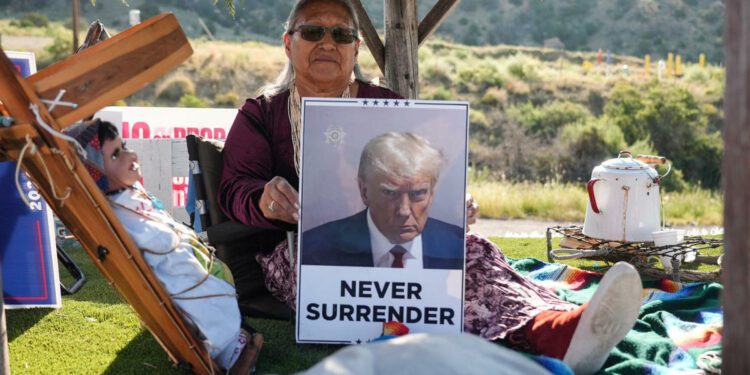A man holds a Harris-Walz sign at the Navajo Nation parade in Window Rock, Ariz.
Democratic state Sen. Theresa Hatathlie, a Harris campaign surrogate, said Navajo votersﻗ feelings about disenfranchisement were valid.
ﻗI do believe thatﻗs accurate,ﻗ Hatathlie said when she was asked to respond to votersﻗ sentiment that their voices arenﻗt being heard by the American government in general.
ﻗSometimes itﻗs so easy to see that we are just a checkbox. We donﻗt want to be a checkbox,ﻗ she said. ﻗWe want to be heard based on the fact that we should listen to understand, not listen to respond.ﻗ
The Trump campaign sent a surrogate, too ﻗ Arizona GOP chair Gina Swoboda ﻗ to spread the Make America Great Again message. Swoboda, too, felt the frustration of government neglect was justified among Indigenous voters.
ﻗThe political system has left the sovereign nation behind because they are not down here, just maybe listening,ﻗ she said. ﻗPresident Trump tried very hard to do that, listening, to do outreach and to make sure he had representatives here in the nations.ﻗ
Kari Lake, the Republican Senate candidate, also marched in the parade and concurred with Swoboda.
ﻗI donﻗt blame them,ﻗ Lake said of Navajo voters who feel theyﻗve been ignored by the government. ﻗBoth [parties] in D.C. have, frankly, not been very good for the people. Thatﻗs why we need citizen politicians.ﻗ
Lakeﻗs opponent in the hotly contested Senate race is Democratic Rep. Ruben Gallego, a longtime advocate for Indigenous causes since he served with Navajo tribe members in the Marines. Since he went to Congress in 2015, Gallego has been the chairman for a federal hearing on the topic of missing and murdered Indigenous women in 2019, led passage of the Native American Child Protection Act and sponsored the BADGES Act to help improve tribal law enforcement on reservations. His advocacy earned him warm welcomes on the parade route.
ﻗI understand the tribal trust responsibility that youﻗre supposed to have as a member of the Senate for the 22 tribal nations here in Arizona,ﻗ Gallego said in an interview before the parade. He has vowed to visit all of Arizonaﻗs 22 federally recognized tribes before Election Day. So far, he has visited 21.
The political candidate who got the strongest reception at the fair is a member of the tribe: Jonathan Nez, the Democratic candidate in Arizonaﻗs heavily Republican 2nd Congressional District. Nez, who was swarmed by young children asking for his autograph, was president of the Navajo Nation for four years until 2023. Now, heﻗs running an underdog race to become Arizonaﻗs first Indigenous member of Congress.

Jonathan Nez is a Democrat running to become Arizona’s first Indigenous member of Congress.
ﻗRuben Gallego, heﻗs visiting all 22 tribes. Heﻗs been in Navajo. … Heﻗs like one of us,ﻗ Nez said. ﻗBut there are other candidates that only come to Navajo just to get their vote, and itﻗs about time Native Americans and the Navajo people recognize that.ﻗ
Nez aims to unseat Republican Rep. Eli Crane, who was also at the parade.
Across several interviews with Navajo voters at the fair, one issue was cited repeatedly as a top challenge of life on the reservation.
ﻗThe dirt roads have been getting bad,ﻗ said Denzel Bia, 22, a rancher from Many Farms. ﻗOne big thing is fixing the roads on the Navajo Nation, putting highways on those dirt roads. Thatﻗs what would help people and save their vehicles.ﻗ
Steve Blackrock, 65, of Black Mesa, said, ﻗWeﻗre really lacking infrastructure on the Navajo reservation, utilities, water power and even roads, a lot of things like that.ﻗ
The Biden-Harris administration elevated Indigenous voices in a history-making way, picking former Rep. Deb Haaland to run the Interior Department. Haalandﻗs appointment made her the first Indigenous Cabinet member, and in March, she announced a $72 million investment to improve electricity infrastructure across tribal communities. The Navajo Nation also used over $520 million in funding from a Biden-backed law to ﻗnearly doubleﻗ new infrastructure building, the Navajo presidentﻗs office announced this year.
In a statement, the Republican National Committeeﻗs Arizona communications director, Halee Dobbins, said: ﻗTeam Trump in Arizona has been dedicated to uplifting the Native American people and addressing the unique challenges facing their communities. We are proud to have staff and volunteers in communities to meet Native American voters where they are.ﻗ
Swoboda, the state GOP chair, argued that Trumpﻗs broad economic policies would bolster Indigenous communities suffering from inflation, an issue aggravated on tribal reservations.
ﻗIf youﻗre living out here, you have to haul water, and you usually have to travel something like 45 miles to get to where to get the water and then back,ﻗ she said. ﻗIf youﻗre looking at gas prices that are out of control, itﻗs going to cripple you.
ﻗYou have to have a sensitivity and listen,ﻗ Swoboda said, emphasizing empathy and understanding while trying to court the Native American vote.
Source link : http://www.bing.com/news/apiclick.aspx?ref=FexRss&aid=&tid=66e40109db2d4e678396314cd8de77c4&url=https%3A%2F%2Fwww.aol.com%2Fnews%2Farizona-campaigns-stepping-indigenous-outreach-211029456.html&c=3977385506623512716&mkt=en-us
Author :
Publish date : 2024-09-12 13:10:00
Copyright for syndicated content belongs to the linked Source.












